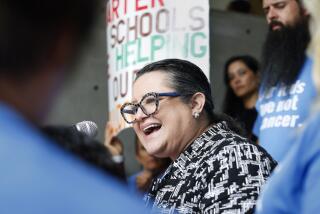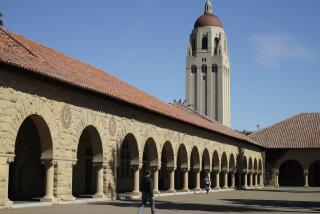Accreditation panel sued as San Francisco college faces closure
SAN FRANCISCO — Faculty unions, teachers and students filed suit Tuesday against the private commission that has moved to revoke the accreditation of City College of San Francisco, alleging that the entity has engaged in unfair business practices, violated conflict of interest laws and flouted its own policies.
The lawsuit adds to mounting criticism of the Accrediting Commission for Community and Junior Colleges, or ACCJC, a nonprofit entity charged with oversight of California’s 112 community colleges as well as those in Hawaii.
The suit, which seeks class-action status, was filed in San Francisco Superior Court by the California Federation of Teachers, American Federation of Teachers Local 2121 and a group of instructors and students -- among them military veterans and a former foster youth who participate in novel programs -- and details how they will suffer if the state’s largest college is shut down.
The action follows a similar suit filed last month by San Francisco City Atty. Dennis Herrera that contends that the commission allowed political bias against the college to sway its decision making.
Herrera separately sued the Board of Governors of the California Community Colleges for ceding its responsibility to set standards and determine eligibility for public funding to the private entity, which he has referred to as “wholly unaccountable.”
Like Herrera’s, Tuesday’s lawsuit seeks to block the commission’s decision to revoke accreditation from going into effect in July 2014. Loss of accreditation would trigger loss of public aid and force the school to close -- denying about 80,000 students access to vocational and educational programs whose quality has gone largely unchallenged.
“This lawsuit seeks to preserve the heritage of a San Francisco institution, the only access that thousands of present and future San Francisco residents have to higher education, and the open access mission foreseen by a generation of Californians,” the suit says.
In a statement Tuesday, the Novato-based ACCJC said it had not yet been served with the legal document and could not comment on specifics.
However, the statement continued, federal regulation “mandates that an accrediting body terminate the accreditation of an institution found in noncompliance with any standard or provide a time frame of no more than two years for the institution to bring itself into compliance. The ACCJC enforced this rule after CCSF had been given much time and opportunity” to do so.
The commission operates as part of the Western Assn. of Schools and Colleges, which is one of six regional associations granted accrediting authority by the U.S. Department of Education. But ACCJC’s own compliance has come under scrutiny.
In response to a complaint by faculty unions, the Department of Education in mid-August faulted the commission for failing to meet a number of federal requirements during its review of the San Francisco college.
Among them: It did not clearly identify deficiencies, thereby allowing the school to be out of compliance with standards for more than two years; failed to include the required number of faculty members on evaluation teams; and engaged in an appearance of conflict of interest by including the husband of ACCJC President Barbara Beno on one such team.
The commission, which has disagreed with several of the findings, was given a year to correct its problems. It is facing a routine fall review of its authority by the Department of Education.
Tuesday’s lawsuit reiterates the Department of Education findings and details additional allegations of conflicts of interest. It also contends that the commission used inappropriate evaluation standards that were not linked to educational quality.
The commission in mid-2012 placed the college on “show cause” status -- one step shy of revocation of accreditation -- citing among other problems poor fiscal planning, an ineffective and overly democratic decision-making process and a failure to properly measure learning outcomes.
College officials and faculty say the school made significant progress in the months that followed, but the commission disagreed and in July made the highly unusual decision to revoke accreditation. California Community Colleges Chancellor Brice W. Harris has appointed a special trustee to govern the multicampus institution, as there is a slight chance it could win an appeal.
Harris has said that focusing on the accreditation commission’s practices detracts from the urgent task of making necessary reforms.
Nevertheless, the state Joint Committee on Legislative Audit last month responded to mounting concerns and authorized a review of the commission.
Alisa Messer, faculty union president and an English instructor at the San Francisco college, said the audit would probably take at least six months. Enrollment is down 14% this year, which could translate into a $20-million reduction in funding next year, she said, and faculty and staff have been steadily departing.
“City College will be proved right in the end but we need to save the college now,” Messer said at a Monday news conference. “The sleight of hand, secrecy and subterfuge of an unaccountable accreditor has done and will continue to do … damage if they are not stopped.”
ALSO:
Michael Jackson judgment day nears as final arguments begin
Dozens with alleged ties to Mexican Mafia arrested in O.C. raids
Madre fire near Azusa: Humidity, low winds should help firefighters
Twitter @leeromney
More to Read
Start your day right
Sign up for Essential California for news, features and recommendations from the L.A. Times and beyond in your inbox six days a week.
You may occasionally receive promotional content from the Los Angeles Times.







